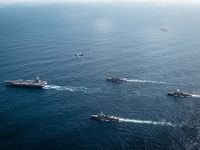Iraq, where OPEC was founded on September 14, 1960, is today using its weight within the cartel to make its voice heard on the world stage and reduce the isolation of a decade-long embargo.
"Iraq hopes that the organisation which was founded on its territory is increasingly successful and united to face new challenges," an Iraqi oil expert speaking on condition of anonymity told AFP.
"We would have liked OPEC to have accomplished more in its four decades of existence but we are nonetheless satisfied with its actions if you take into account the political situation it has worked in," he added.
Under embargo since the 1990 invasion of Kuwait and largely sidelined in regional groupings and the United Nations, Baghdad considers OPEC a forum that allows it to speak out because of the country's immense oil reserves, second in the world only to those of Saudi Arabia.
Conscious of Iraq's oil wealth, Venezuelan President Hugo Chavez openly defied the United States by visiting Baghdad on August 10 to personally invite Saddam Hussein to the cartel's summit from September 26-28.
It is only the second such meeting since the Organisation of Petroleum Exporting Countries was founded in Baghdad in September 14, 1960. The last took place in Algiers in 1975.
The visit by Chavez, whose country holds the rotating presidency of OPEC, was the first to Iraq by a head of state since the 1991 Gulf War.
Iraq plans to mark next week's 40th anniversary of the creation of OPEC with celebrations and a symposium.
"Iraq's attachment to OPEC is not explained solely by its role in the oil market but also by Baghdad's political motivation to break its international isolation," a western diplomat based in Baghdad told AFP.
"Iraq has benefited from its membership in OPEC to make its voice heard and strike up contacts with other countries, notably during the early years of the embargo," he said. Iraq has taken part in all OPEC meetings "even when it was not authorised to export oil (between 1990 and 1996), to prove it would remain a key actor at the heart of this important group," the diplomat said.
For the Iraqi expert, "OPEC will continue to play a major role on the oil market even if some announced its death several years ago."
"All studies confirm that oil will remain a vital and irreplaceable product for the moment, which means the organisation that determines the oil strategies of these countries will continue to be influential for at least the next decade." Sharing this view, the governmental newspaper Al-Jumhuriya voiced hopes Tuesday that OPEC will transform itself into an influential economic bloc to counter US dominance.
In an article titled "Iraq triumphs, OPEC crushes US hegemony", the daily said "the upcoming OPEC summit raises great hopes of seeing the organisation transforming itself into an influential economic bloc."
Concerned at preserving the "independence" of OPEC, Iraq has even put forward its own candidate, Abdel Amir al-Anbari, to succeed Nigerian Rilwanu Lukam as the cartel's secretary general.
Even if he has little chance of being elected, Anbari's candidacy allows Iraq to block candidates from Iran and Saudi Arabia, Baghdad's main rivals in the region, as the post has to be elected unanimously. Iraq is authorised to export crude oil under a programme to finance imports of essential goods under strict UN supervision.
Although an OPEC member, it is exempted from the cartel's production quota system because of the embargo. – (AFP)
© Agence France Presse 2000
© 2000 Mena Report (www.menareport.com)







